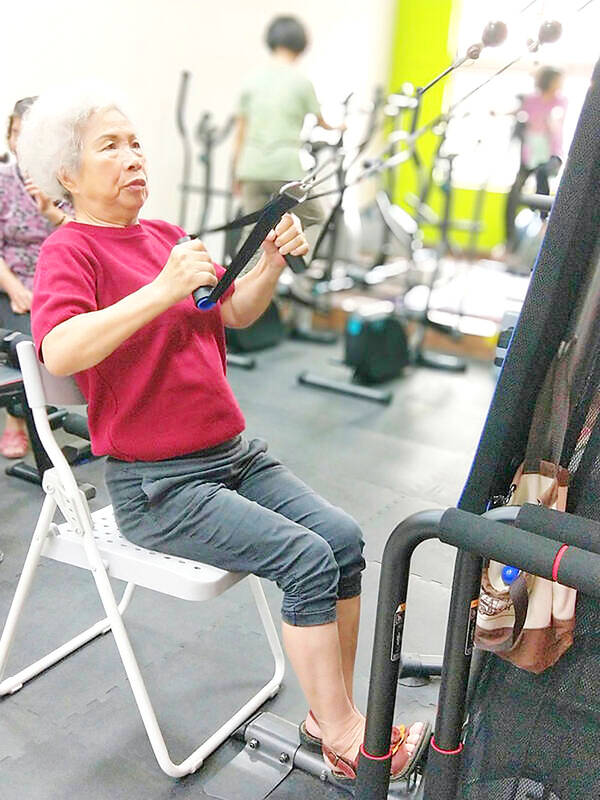The prevalence rate of hip fractures in Taiwan is the highest among Asian countries, the Taiwanese Osteoporosis Association (TOA) said yesterday, adding that osteoporosis is a “silent killer” that has no obvious symptoms and that the mortality rate following a hip fracture can be higher than some types of cancers.
The association on World Osteoporosis Day yesterday reminded people of bone health and osteoporosis prevention, as people can lose bone density without symptoms and have higher risk of bone fractures.
Osteoporosis is a “silent killer,” because many patients are unaware of their bone loss until they experience a fracture, TOA chairperson and Kaohsiung Medical University Chung-Ho Memorial Hospital orthopedist Chen Chung-hwan (陳崇桓) said.

Photo: Lin Liang-che, Taipei Times
After a person experiences a bone fracture, the risk of having another bone fracture in the next three to six months increases by five times, he said.
A bone fracture also often leads to a series of complications, including bedsores, pneumonia, urinary tract infection, and inflammation of a vein, Chen said, adding that being bedridden for a long time can also cause malnutrition or depression, significantly decreasing their life quality.
The prevalence rate of hip fracture in Taiwan is the highest among Asian countries and ranks ninth highest in the world, he said.
Foreign and local studies have shown that the one-year mortality after sustaining a hip fracture is estimated to be between 10 percent and 20 percent, which is relatively high — even higher than some types of cancers, Chen said.
Mortality rates in the first year after a hip fracture are between 20 percent and 24 percent, and the increased risk of dying might persist for at least five years afterwards, the International Osteoporosis Foundation’s factsheet showed.
Loss of function and independence among hip fracture survivors is profound, with 40 percent unable to walk independently, 60 percent requiring assistance a year later, and 33 percent are totally dependent or in a nursing home in the year following a hip fracture, the factsheet said.
Peak bone mass is usually achieved by the age of 25, and people start to lose bone mass past 40 years old, Chen said, adding that menopause significantly speeds bone loss, so postmenopausal women are at significant risk for osteoporosis.
If postmenopausal women have signs of “a stooped posture, loss of body height, or lower back pain,” they are recommended to get a non-invasive dual-energy X-ray absorptiometry (DXA) scan to measure their bone density, Chen said.
He also suggested postmenopausal women, men aged 70 or older, people who are taking long-term steroid treatment, and people aged 50 or older who have experienced a bone fracture or who are at risk for osteoporosis to get bone density screening regularly.

Taiwan is stepping up plans to create self-sufficient supply chains for combat drones and increase foreign orders from the US to counter China’s numerical superiority, a defense official said on Saturday. Commenting on condition of anonymity, the official said the nation’s armed forces are in agreement with US Admiral Samuel Paparo’s assessment that Taiwan’s military must be prepared to turn the nation’s waters into a “hellscape” for the Chinese People’s Liberation Army (PLA). Paparo, the commander of the US Indo-Pacific Command, reiterated the concept during a Congressional hearing in Washington on Wednesday. He first coined the term in a security conference last

Prosecutors today declined to say who was questioned regarding alleged forgery on petitions to recall Democratic Progressive Party (DPP) legislators, after Chinese-language media earlier reported that members of the Chinese Nationalist Party (KMT) Youth League were brought in for questioning. The Ministry of Justice Investigation Bureau confirmed that two people had been questioned, but did not disclose any further information about the ongoing investigation. KMT Youth League members Lee Hsiao-liang (李孝亮) and Liu Szu-yin (劉思吟) — who are leading the effort to recall DPP caucus chief executive Rosalia Wu (吳思瑤) and Legislator Wu Pei-yi (吳沛憶) — both posted on Facebook saying: “I

The Ministry of Economic Affairs has fined Taobao NT$1.2 million (US$36,912) for advertisements that exceed its approved business scope, requiring the Chinese e-commerce platform to make corrections in the first half of this year or its license may be revoked. Lawmakers have called for stricter enforcement of Chinese e-commerce platforms and measures to prevent China from laundering its goods through Taiwan in response to US President Donald Trump’s heavy tariffs on China. The Legislative Yuan’s Finance Committee met today to discuss policies to prevent China from dumping goods in Taiwan, inviting government agencies to report. Democratic Progressive Party Legislator Kuo Kuo-wen (郭國文) said

The Ministry of Economic Affairs has fined Taobao NT$1.2 million (US$36,900) for advertisements that exceeded its approved business scope and ordered the Chinese e-commerce platform to make corrections in the first half of this year or its license would be revoked. Lawmakers have called for stricter supervision of Chinese e-commerce platforms and more stringent measures to prevent China from laundering its goods through Taiwan as US President Donald Trump’s administration cracks down on origin laundering. The legislature’s Finance Committee yesterday met to discuss policies to prevent China from dumping goods in Taiwan, inviting government agencies to report on the matter. Democratic Progressive Party